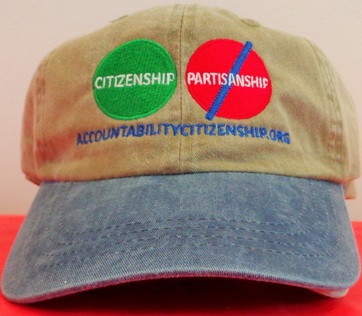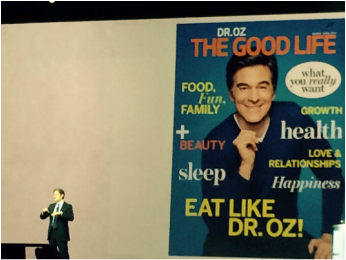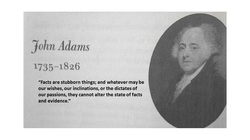
First of all, elected officials should be public servants. We have collective amnesia on what a public servant is, and we tolerate too many people in elected office who are self servants on the public payroll. A public servant serves the people they represent--all of them--regardless of their political party or whether they made a campaign donation. Some of you are thinking, well, if an elected official doesn't put donors or members of their own party first, they won't get re-elected. But as soon as we allow elected officials to put their own re-election ahead of their duty to the public that they serve, we have decided to lower the standard for public service. We have decided to accept public officials who do their duty only when it doesn't hurt their chances for re-election. When we accept politicians putting their own tenure or benefit ahead of their duty to the public good, the public good will always be a secondary concern.
Second, elected officials should be completely beyond reproach in their performance of duty. That doesn't mean that everyone has to like everything an elected officials does: popularity is not the same thing as being beyond reproach in the performance of one's duty. Performing one's duty in a manner that is beyond reproach means being 100 percent transparent (honest and clear) about what you are doing and why, and being able to articulate how your actions are related to the duties you have been elected to carry out. Again, we have allowed ourselves to grow complacent and accept a low standard of honor and duty in many of our public officials. In Utah, for instance, our last two state attorneys general are facing felony charges for accepting bribes and selling influence--charges that could land them in jail for 30 years each if they are found guilty. Now I am not really interested in whether they are guilty or innocent. My point is that, when it comes to the laws that cover bribery and selling influence, we should not tolerate behavior that is anywhere close to being illegal in a public official. If your behavior is close enough to the line between legality and illegality that you can be indicted for five or ten felonies, you have NO business being a public official. Accepting gifts while in public office is an absolute non-starter. That is why federal officials are restricted from giving or receiving gifts above a token value, and must turn over to the federal government anything received above that value. As a young Army officer, I was taught the "headline test." If you are about to do something that you would be uncomfortable reading as a headline in the New York Times or the Washington Post, then you have no business doing it as long as you are a public official.
This last point bears repeating. We should not tolerate public officials who behave in a way that is just barely legal. We want public officials who are scrupulously honest, even to the point of hurting their chances for re-election. Last month, a story about the scandal involving the two former Utah attorneys general carried the headline "Make Mike Lee our guy". Mike Lee is a United States Senator from Utah. One of the people involved in the corruption trial against one of the former attorney generals claimed that attorney general was bundling campaign contributions--giving money to people so they could donate it to Mike Lee in order to circumvent the federal law restricting individual contributions. The article was quick to point out that Mike Lee didn't know about the illegal bundling, and that is great. The question that arose in my mind, though, was how the illegal contributions could "make Mike Lee our guy" unless at some point, someone intended to let him know they represented some dollar amount of contributions. I understand that conversation would not implicate Mike Lee in any wrongdoing as long as Lee understood the individual contributions were legitimate and not the product of illegal bundling. My point here is that, regardless of the legalities involved, career citizens would respond very differently than career politicians to someone claiming to represent some dollar amount of contributions. A career citizen would respond by saying something like, "Thanks for your contribution. You know I don't condone or practice pay-as-you-go politics, but I hope you are happy enough with my performance in support of all the citizens in our city/county/state to support me in the next election as well." A career politician, on the other hand, might behave so as to indicate that donors got special treatment as a result of their donation(s). Maybe donors letters get answered when others do not. Maybe legislative priorities mirror the priorities of certain donors. Those are behaviors that wink at corruption, even though they may be perfectly legal in and of themselves. In sum, a career citizen demonstrates a pattern of selflessness--putting the welfare of others before their own welfare--while a career politician demonstrates a pattern of taking care of themselves, especially their re-election, as a top priority.
Why am I spending so much time talking about corruption? After all, this is America, right? Sure, we have our scandals, but we don't really have a corruption problem, do we? Yes we do, at least in my humble opinion. Lets look at the most obvious examples in recent years: Rod Blagojevich, 40th Governor of Illinois, began serving a 14-year prison term in 2012 for corruption. Blagojevich was elected 3 times to the United States House of Representatives before spending 6 years as the governor of Illinois before being impeached. Blagojevich served as the representative in Illinois' 5th congressional district before running for governor. You may remember Dan Rostenkowski? He was the representative in the same district for 36 years and was chairman of one of the most powerful committees in the U.S. Congress before pleading guilty to mail fraud in 1994. How about Bob McDonnell, remember him? He was the governor of Virginia from 2010 to 2014. He was indicted on federal charges ten days after leaving office and convicted a few months later of accepting improper gifts and loans while in office. Before becoming governor, by the way, McDonnell served as the attorney general for Virginia, and before that he was a member of Virginia's House of Delegates for 14 years. These are not peripheral, no-name, skulk-in-the-shadows perpetrators. They are main-line politicians serving as elected officials in major state and federal government positions for long periods of time. If you think they just all-of-a-sudden crossed a line or lost sight of the law, I think you are naive. It is far more likely these people engaged in a long-term pattern of increasingly corrupt behavior that eventually became so obvious that they found themselves facing charges. We have a corruption problem in public politics, America, and we need to make it our top priority to elect career citizens who demonstrate the willingness not just to live within the law, but the passion for setting an example of selfless and honorable public service.
How do we know who to vote for? Well, first of all, I would say do not vote for people who have demonstrated long-term success in politics. Not all such people are bad, of course, but we have to understand that politics, like war, is a morally toxic endeavor. We should, therefore, elect people who have become successful outside of politics, and we should insist that our elected public servants remove themselves from public office and return to private employment or business for reasonable stretches of time. This is not a matter of kicking people out of office because they have done poorly. It is a matter of forcing people to take a break from the morally toxic environment of politics. Perhaps they can return at a later time, and perhaps not. That is not the point. Remember, we are talking about elected public servants, not people who are elected to look after their own careers in politics. Term limits? Sure. But how about we just all decide we aren't going to re-elect the same people over and over? The Constitution gives us the power to change 87 percent of Congress every two years, but we re-elect incumbents in about 90 percent of the races where they choose to seek re-election. You want better, more honest government? Elect people who have earned--not inherited--their own success in the private sector, and don't let them stay in office for more than a few years at a time.
Well, you say, I am a Democrat or a Republican, and the only way I can vote for candidates who believe what I believe is to vote for the candidate who shares my party affiliation, and the only candidates in my party are those who are long-term incumbents. So really, I don't have a choice--I have to vote for the incumbent, right? No, you don't. You have to accept that it is more important to elect someone fresh than it is to elect someone who claims to think like you do. After all, it is not the case that any elected official waltzes into office and immediately succeeds in getting all of their political beliefs enshrined into law. We have ponderous bureaucracies that ensure our government does not reflect the views of any one public official. Electing someone who is fresh is more important to restoring honest, open and efficient government than electing someone who claims to think like you. Oh, and by the way, people who get elected because they claim to think the way the majority of their constituents think might not be the best people to elect in the first place. Think about it. I believe the question we should ask everyone seeking public office is this: "what is the most important view you hold that runs against the popular opinion of your party, and what are your reasons for holding that view?" This is a litmus test because it forces someone to either take a real risk or to play it safe. People who play it safe and claim to support their party in every respect are not fit to be public servants. That is why the picture at the top of this page shows a green "go" light around citizenship and a red "stop" light around partisanship. People who cannot speak intelligently about an important issue where their personal views diverge from the prevailing opinion of their political "team" lack either moral courage or intellect. It is just that simple. No one should agree with everything a political party stands for in every instance.
So that's it! Running for office against an entrenched incumbent is a sacrifice. We need career citizens--credible people with real track records of merit-based success outside of politics--to volunteer to run for office now more than ever. When it comes time to decide between candidates, we need to favor challengers over incumbents. We need to look closely for behavior-based evidence of character and selflessness. Character and selflessness in this context are measured by the demonstrated willingness to make the good of a business or other non-political organization a higher priority than one's personal interests. Claims of religiosity or political affiliation are not evidence of character. Such claims are cheap and often counterfeit. For me, the candidate who gets my vote is the non-incumbent with a record of serving others who offers the best answer to the question: "what is the most important view you hold that runs against the popular opinion of your party, and what are your reasons for holding that view?"







 RSS Feed
RSS Feed
